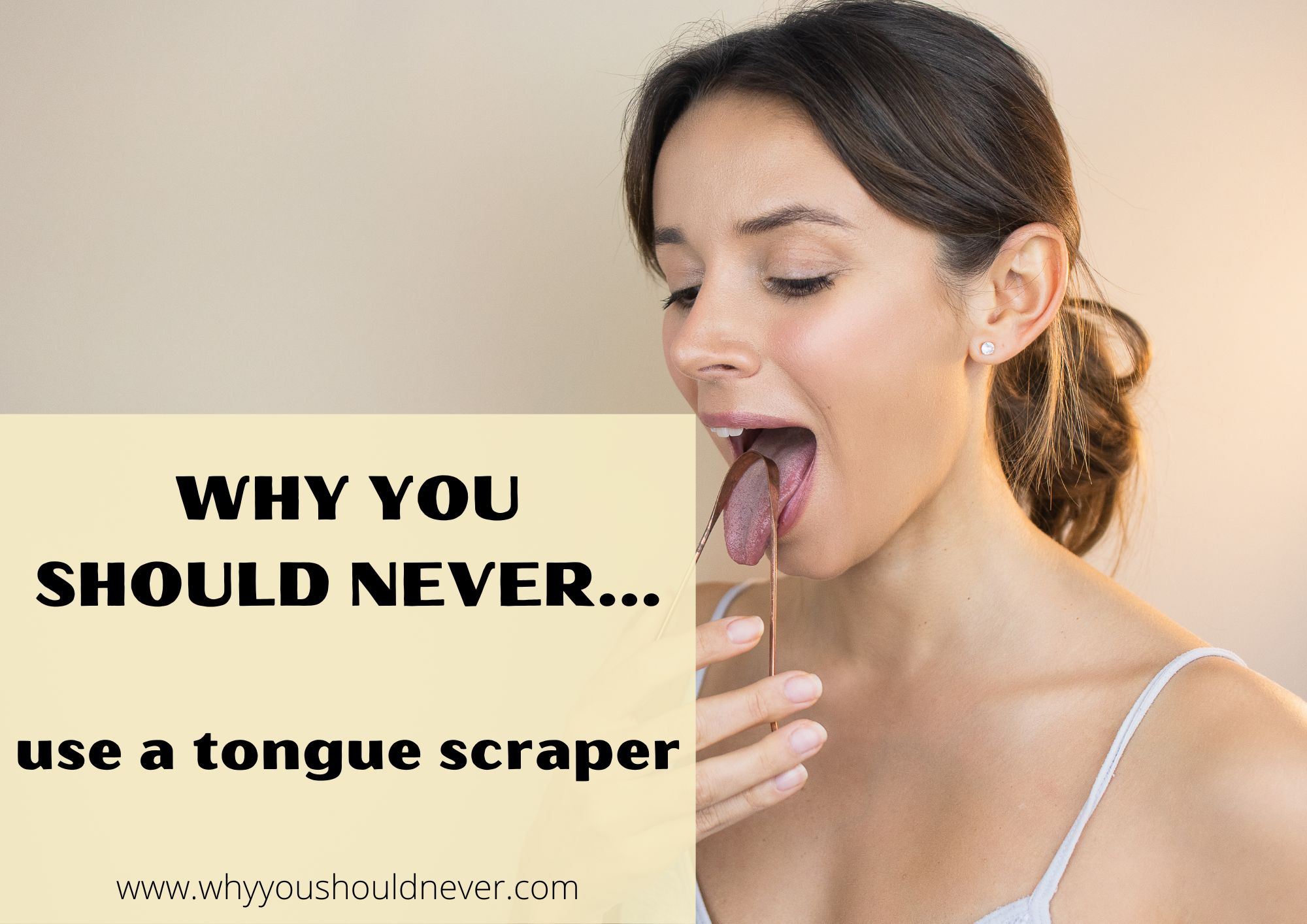![]()
Why You Should Never Use A Tongue Scraper
“Roll out of bed, brush your teeth, scrape your tongue.” If this sounds like your morning routine, you might want to pump the brakes for a moment.
Now, tongue scraping – it’s hailed by many as an essential part of oral hygiene. Dentists recommend it, wellness influencers swear by it, and many a bathroom shelf is adorned with this humble tool, promising you a pink, squeaky-clean tongue and fresh breath that could knock a flower over.
Yet, what if I told you that this seemingly innocuous tool could potentially be doing more harm than good? Brace yourself; we’re about to debunk some oral health myths.
6 reasons why you shouldn’t use a tongue scraper
1. The scourge of good bacteria
One of the first things that you might not realize about the tongue scraper is its insensitivity to the delicate ecosystem in your mouth. See, your mouth is home to an assortment of bacteria – some naughty, some nice.
Your tongue scraper, much like a bull in a china store, doesn’t discriminate – it just barrels in and sweeps away everything in its path. You might think you’re doing yourself a favor by wiping out bacteria, but you’re also evicting the beneficial ones that aid digestion and protect your oral health.
It’s like throwing the baby out with the bathwater.
2. The trauma drama
Here’s another kicker – excessive scraping can cause micro-trauma to your tongue. Imagine sandpaper on silk… not a pretty sight, huh? Persistent scraping can lead to small cuts, inflammation, and even alter your taste buds.
So, if you’ve noticed your morning coffee tasting a bit like cardboard recently, your scraper might be the culprit.
3. The illusion of clean
Now, this is the pièce de résistance. Many people use tongue scrapers because they believe it helps freshen their breath, eliminating the dreaded morning breath or the lingering scent of that garlic-infused lunch.
Here’s the rub: most bad breath is actually caused by bacteria deep within the gums and at the back of the tongue, where your scraper can’t reach. Using a scraper can provide a false sense of cleanliness, making you overlook deeper oral health issues.
4. The risk of infection
Remember the micro-trauma we talked about? Those tiny cuts on your tongue provide the perfect entry point for infection-causing bacteria, turning your mouth into a sort of bacteria theme park.
And if you share your tongue scraper with others (please don’t!), you’re just inviting a bacterial house party.
5. The obsessive overkill
Scraping your tongue can easily become an obsession, leading to overuse. Twice a day turns into four times, then six, and before you know it, you’re carrying your scraper around like a trusty sidekick.
Over-scraping not only harms your tongue but also disrupts the natural process of cell regeneration, leaving you with a rough, sensitive tongue.
6. Erm… ew!
And let’s not forget the ick factor. I mean, we’re all friends here, so let’s get real for a second. After a good scrape, what are you left with? That’s right, a scraper laden with bacteria, dead cells, and food debris. Lovely.
Now, unless you’re religious about cleaning your scraper (and I mean deep cleaning), that little tool of yours is basically a smorgasbord of bacteria just waiting for their next ride on the tongue express.
And if you’re not careful, you might end up reintroducing old bacteria or even adding new ones. Yikes!
How to clean your tongue the right way
Now that we’ve established that tongue scraping might not be the golden ticket to oral health it’s made out to be, you might be wondering, “Well, how should I clean my tongue then?”
Worry not, I’ve got you covered. Let’s break down the proper, gentle ways to keep your tongue clean, fresh, and happy.
Brushing – not just for teeth
Your toothbrush isn’t just good for scrubbing your pearly whites. It can also be a gentle tool for cleaning your tongue. After brushing your teeth, simply give your tongue a gentle brush as well. This will help dislodge any food particles stuck on your tongue without causing any micro-trauma.
Gentle is the operative word here. Your tongue isn’t a carpet stain, it’s a delicate part of your mouth. Treat it with kindness.
A swish of mouthwash
Mouthwash isn’t just for fresh breath; it can also be a great way to clean your tongue. After brushing, rinse with an antibacterial mouthwash. This will not only help kill off the bad bacteria causing bad breath, but also reach the back of your tongue, where your toothbrush may not reach.
Drink plenty of water
It sounds simple, but drinking water throughout the day can help keep your tongue clean. Water washes away food particles and bacteria that could otherwise set up shop on your tongue, leading to bad breath and other oral health issues.
Staying hydrated also helps stimulate saliva production, which is your body’s natural defense against bacteria in your mouth.
Dietary choices matter
What you eat can also play a significant role in how clean your tongue is. Consuming a balanced diet rich in fruits, vegetables, and whole grains helps to naturally clean your tongue and teeth.
On the flip side, foods high in sugar and acidic drinks can promote bacterial growth, leading to a coated tongue and bad breath.
Regular dental check-ups
And, of course, don’t forget your regular dental check-ups. Your dentist can clean areas of your mouth that you may miss and can also check for any signs of oral health issues that might need attention.
Remember, tongue hygiene is important, but it doesn’t have to involve harsh scraping. With these tips, you can maintain a healthy, clean tongue, and keep your breath fresh, all while preserving the delicate balance of your mouth’s ecosystem.
